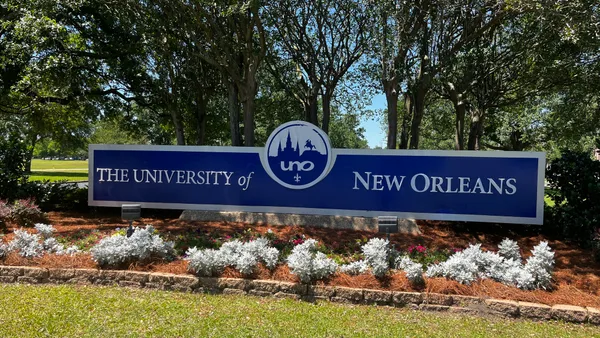Dive Brief:
- A federal civil rights lawsuit filed last week challenges an Illinois scholarship program aimed at increasing diversity among teacher candidates, claiming it discriminates against nonminorities.
- The suit, filed by public interest law firm Pacific Legal Foundation on behalf of American Alliance for Equal Rights, claims the Minority Teachers of Illinois Scholarship Program "imposes an explicit racial barrier" and is "blatant race-based discrimination" in violation of the 14th Amendment's equal protection clause.
- Seeking for the scholarships to be opened to nonminorities, the lawsuit claims the program discriminates against those who are not American Indian or Alaska Native, Asian, Black or African American, Hispanic or Latino, or Native Hawaiian or Other Pacific Islander — and "who could otherwise contribute to a robust teacher pipeline."
Dive Insight:
When the U.S. Supreme Court overturned race-conscious admissions policies at higher education institutions in a landmark ruling last year, education policy experts predicted the decision would reverberate in other areas of education, such as K-12 admissions and teacher pipelines.
Pacific Legal has indeed filed multiple lawsuits challenging K-12 admissions policies at charter or magnet schools. Supreme Court justices are currently considering whether to hear Boston Parent Coalition for Academic Excellence Corp. v. The School Committee for the City of Boston, a case the law firm filed over a temporary admissions policy meant to diversify student bodies at three competitive Boston schools.
Last term, the court rejected hearing another similar high-profile case from Pacific Legal, TJ v. Fairfax County School Board, after weighing in conference several times whether to take it.
Other comparable cases are pending in lower courts in Maryland’s Montgomery County and in New York City.
However, this week's lawsuit filed in U.S. District Court for the Central District of Illinois, AAER v. Pritzker, is among the first that could come with implications for teacher education programs and, consequently, teacher pipelines.
Scholarship programs such as the Illinois state program are meant to diversify the education workforce.
Awards made under the Illinois program are "intended to help diversify the teaching pool and provide a supply of well-qualified and diverse teachers for hard-to-staff schools," the scholarship's website says. "The program was also created with a goal of narrowing the achievement gap associated with race, based in part on theories that minority children may perform better if some of their teachers are members of racial/ethnic minority groups."
A high school senior who plans to pursue an education degree is among those challenging it. The student is a member of the American Alliance for Equal Rights.
According to the lawsuit, the nonminority plaintiff has already "been awarded several scholarships," but would still have to pay some $22,000 out of over $40,000 — the college tuition and fees for the 2024-25 academic year.
"An award from the Scholarship Program would significantly defray" the plaintiff's costs, the lawsuit says. "Except for her race," according to the lawsuit, the unnamed plaintiff "is qualified, ready, willing, and able to apply to the Scholarship Program."
“Illinois can offer assistance to young, aspiring teachers, but not when they exclude a significant number of applicants based on their skin color,” said Pacific Legal's attorney Erin Wilcox in a statement on Tuesday. Not opening up the minority scholarship program to nonminorities "misses the mark on providing an equal opportunity for all future teachers," Wilcox said.
The Illinois Student Assistance Commission, which administers the scholarships, did not respond to multiple inquiries from K-12 Dive.
















